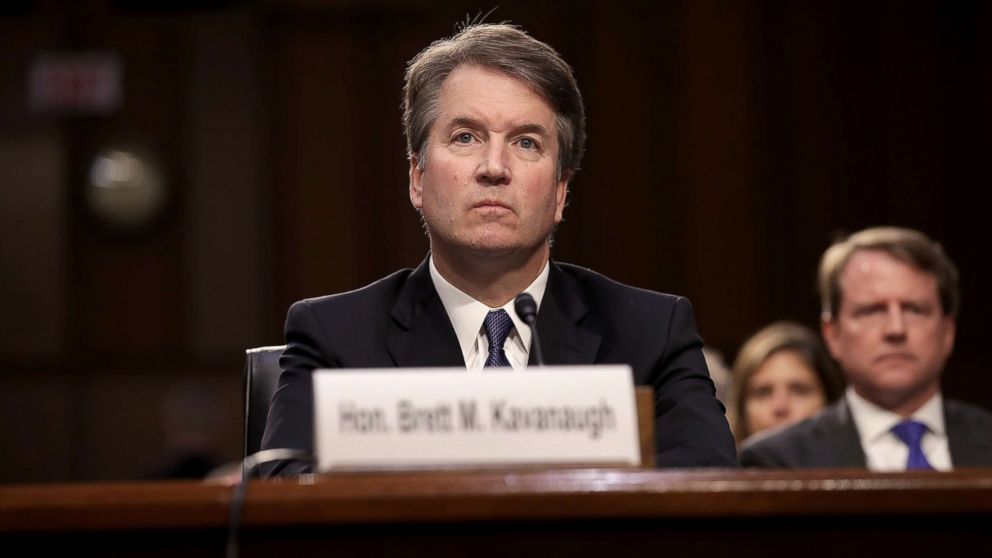
Protesters were removed from Judge Brett Kavanaugh's confirmation hearing for a second day on Wednesday as Senate Judiciary Committee Chairman Chuck Grassley accused Democrats of coordinating with protesters to disrupt the hearings.
The Supreme Court nominee is set to answer questions from senators throughout the day for the first time Wednesday.
Members of the committee will have 30 minutes each to question Kavanaugh on a variety of issues and on his record as a federal judge.
"We will get through each question today, no matter how long it takes," Grassley said.
Grassley started off the questioning by asking Kavanaugh to describe his idea of a good judge. As protesters interrupted repeatedly, Kavanaugh said that a good judge is independent, citing cases such as Brown v. Board of Education and United States v. Nixon, in which courts issued unpopular rulings despite political or public pressure.
"I'm a pro-law judge and I've ruled for parties based on whether they have the law on their side. That's part of being an independent judge -- is ruling for the party no matter who they are so long as the party is right. If you walk into my courtroom and you have the better legal arguments, you will win," he said.
Democrats are expected to question Kavanaugh on his views on previous Supreme Court decisions, including Roe v. Wade and Citizens United, but he said "nominee precedent" weighs heavily on him as he answers questions. He cited previous Supreme Court nominees as insisting in their confirmation hearings that judges can offer no forecasts or hints on how they might rule on a case.
"If I say something and the case comes before me five years from now I'll feel morally bound by what I said here. If I've crossed the line of what I should say, then I'm not going to have an open mind in that case. That's a violation of judicial independence," he said.
Tuesday's hearing was interrupted and delayed by protesters and protests from Democrats who say the hearing should be delayed until they receive more documents from Kavanaugh's time working for President George W. Bush.
Republicans accused the minority of playing politics with a nomination they've already promised to oppose, but that won't stop them from asking charged questions about a number of high-profile issues in the next two days as they press Kavanaugh to discuss his views on abortion, gun rights, the powers of the presidency and whether President Donald Trump could be subpoenaed in the special counsel's investigation.
"Precedent upon precedent" affirmed Roe v. Wade
The ranking Democrat on the committee, Sen. Dianne Feinstein, was the first to ask Kavanaugh about abortion. She asked him to explain what he means when he says the Roe v. Wade decision is "settled law."
Kavanaugh called Roe v. Wade "important precedent of the Supreme Court" that has been reaffirmed many times over the years, most importantly in the Planned Parenthood v. Casey decision in 1992. In that case, he said the Supreme Court evaluated all the points of Roe using the legal process for evaluating previous cases and reaffirmed the decision, which makes Casey "precedent upon precedent" for the Roe decision, which established the legal right to an abortion in the United States.
He said he understands Feinstein's point of view that women should have a right to legal abortion, though he did not say he agreed with that view.
"I understand how passionate and how deeply people feel about this issue. I understand the importance of the issue. I understand the importance that people attach to the Roe versus Wade decision, to the Planned Parenthood versus Casey decision. I don't live in a bubble. I understand, I live in the real world. I understand the importance of the issue," he said.
Earlier in the hearing, Kavanaugh said that leading up to his nomination, he was not asked his opinion on Roe or how he would rule in specific cases.
Kavanaugh: "I said that it's settled as a precedent of the Supreme Court entitled to respect ... it has been reaffirmed many times" https://t.co/WQ5biYuAIX pic.twitter.com/Cq697yPb4k
Can a president be forced to respond to a subpoena?
Kavanaugh said the United States v. Nixon decision that forced President Richard Nixon to turn over tapes to the special prosecutor was "one of the greatest moments in Supreme Court history" because the justices stood up for judicial independence in a moment of national crisis.
But he declined to answer specifically Feinstein's question about whether a sitting president can be required to respond to a subpoena, saying it would violate the principle that nominees shouldn't give views on hypothetical cases.
"I can't give you an answer on that hypothetical question," he said.
Brett Kavanaugh: "... I can't give you an answer on that hypothetical question" https://t.co/WQ5biYuAIX pic.twitter.com/dHl7IqmvBI
Feinstein also asked Kavanaugh about his frequently cited comments that a president should not be investigated on criminal charges while in office.
Kavanaugh said he proposed ideas for Congress to consider in the 1998 article but "they were not my constitutional views" and that he has never taken a position on what the Constitution says about investigating a sitting president.
This is a developing story. Please refresh for updates.
ABC News' Trish Turner contributed to this report.
from ABC News: Politics https://ift.tt/2NgSdyp
0 Response to "Kavanaugh declines to answer whether a president can be subpeonaed"
Posting Komentar